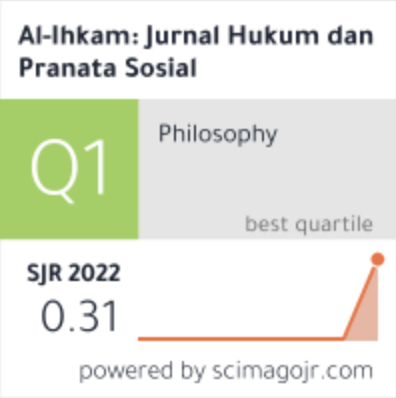Understanding of Polygamy in the Qur’anic Text, Hadith Text, and Biblical Text
 Abstract views: 410
,
Abstract views: 410
,
 PDF downloads: 365
PDF downloads: 365
Abstract
The difference in views that often arises and becomes the latest issue in the context of family law is polygamy. Polygamy is misunderstood as something that is frightening for some people so it needs to be shunned. This paper aims to explain various views about polygamy according to the Qur'anic text, hadith text and bible text. The method used is library research with a sociological-historical approach. The results of this study found several things, namely: polygamy in the text of the Koran and the hadith of the Prophet there are similarities and no differences were found, even the hadith of the Prophet became a reinforcement of the Koran about the limits of permissibility of polygamy with conditions apply fairly. Whereas polygamy in the text of the Bible is permitted without limitation on the number of women being polygamy and not being fair, even though Christians forbid polygamy.
Downloads
References
Abdurrahman, U. “Penafsiran Muhammad ‘Abduh Terhadap Alquran Surat Al-Nisâ’ Ayat 3 Dan 129 Tentang Poligami.” Al-’Adalah 14, no. 1 (2017): 25. https://doi.org/10.24042/adalah.v14i1.1139.
Al-Sijistānī, Abu Dāwud bin al-Asy’aṡ. Sunan Abi Dāwud. Vol. 2. Riyāḍ: Bait al-Afkār al-Dawliyah, t.t.
Al-Bukhāri, Muḥammad bin Ismā’il bin Ibrāhīm bin al-Mughīrah al-Ju’fi. Ṣaḥīḥ Al-Bukhāri. Vol. 3. Beirūt: Dār al-Ṭūq al-Najaḥ, 1422.
Al-Dimasqi, Imāduddīn Abu al-Fidā Ismā’īl bin Kaṡīr. Tafsīr Qur’ān Al-Aẓīm. Vol.2. Kairo: Muassasah al-Qurṭubah, 2000.
Al-Jazāiri, Abu Bakar Jābir. Aisar al-Tafāsir. Al-Madīnah al-Munawwarah: Maktabah al-Ulūm wa al-Ḥikām, 2003.
Al-Mubārakfūri, Muḥammad Abdurraḥmān bin Abdurraḥīm. Tuḥfat al-Aḥważi bi Syarḥ Jāmi Al-Tirmiżī. Vol. 4. Beirūt: Dār al-Fikr, t.t.
Al-Qazwīni, Abu Abdillah Muḥammad bin Yazīd. Sunan Ibnu Mājah. Vol. 1. Beirūt: Dār al-Iḥyā’ al-Kutub al-Arabi, t.t.
Al-Ṣabūnī, Muḥammad Ali. Rawāi’ Al-Bayān: Tafsīr Ayāt al-Aḥkām Min al-Qur’ān. Beirūt: Al-Maktabah al-‘Aṣriyah, 2005.
Al-Syafi’i, Muhammad bin Idris. Al-Umm. Vol. 5. ttp.: Dar al-Wafa, 2001.
Al-Zuhaili, Wahbah. Wahbah al-Zuhaili, Al-Tafsīr Al-Munīr fī Al-Aqīdah wa al-Syarī’ah Wa Al-Manhaj. Damaskus: Dār al-Fikr, 2009.
Barry, Pius A Partanto dan M. Dahlan Al. Kamus Ilmiah Populer. Surabaya: Arkola, 1994.
Brooks, Thom. “The Problem with Polygamy.” Philosophical Topics 37, no. 2 (2018): 109–122.
Denike, Margaret. “The Racialization of White Man’s Polygamy.” Hypatia 25, no. 4 (2010): 852–874.
Departemen Pendidikan dan Kebudayaan. Kamus Besar Bahasa Indonesia. Jakarta: Balai Pustaka, 1989.
Farida, Siti Musdah Mulia dan Anik. Poligami: Budaya Bisu yang Merendahkan Martabat Perempuan. Yogyakarta: Kibar Press, 2007.
Ḥanbal, Aḥmad bin. Musnad Al-Imām Aḥmad Bin Ḥanbal. Vol. 42. Beirūt: al-Muassasah al-Risālah, 2001.
Hazleton, Lesley. Israeli Women: The Reality behind the Myths. New York: Simon and Schuste, 1977.
Helim, Abdul. “Poligami Perspektif Ulama Banjar” 12, no. Cd (2017): 1–29.
Hillman, Eugene. Polygamy Reconsidered: African Plural Marriage and the Christian Churches. New York: Orbis Books, 1975.
Lara Burton, Cardell K. Jacobson and. Modern Polygamy in the United States: Historical, Cultural and Legal Issues. New York: Oxpord University Press, 2011.
Machali, Imam. “Poligami Dalam Perdebatan Teks Dan Konteks: Melacak Jejak Argumentasi Poligami Dalam Teks Suci.” PALASTREN 8, no. 1 (2015): 35–56.
Mālik, Imam. Muwaṭṭā’ Al-Imām Mālik. Vol. 4. Beirūt: Muassasah Zāyid bin Sulṭān Ᾱli Nahyān, 2004.
Mansur. “Dekonstruksi Tafsir Poligami: Mengurai Dialektika Teks Dan Konteks.” Al-Ahwal: Jurnal Hukum Keluarga Islam 1, no. 1 (2008): 31–64. http://ejournal.uin-suka.ac.id/syariah/Ahwal/article/view/01103.
Moqsith, Abd. “Tafsir Atas Poligami Dalam Al-Qur’an.” KARSA 23, no. 1 (2015): 133–49.
Nasution, Hotnidah. “Pembatalan Perkawinan Poligami di Pengadilan Agama (Tinjauan Dari Hukum Positif).” Jurnal Cita Hukum 1, no. 1 (2013): 137.
RI, Departemen Agama. Al-Qur’an dan Terjemahnya. Bandung: Diponegoro, 2006.
Rohmansyah. “Analisa Pendekatan Bahasa dan Historis Terhadap Poligami Dalam Hadis Nabi.” Kalimah 17, no. 1 (2019): 59–74.
Sābiq, Sayyid. Fiqh al-Sunnah. Vol. 2. Beirūt: Dār al-Fikr, 2008.
Shadily, Hasan. Ensiklopedi Indonesia. Jakarta: Ichtiar Baru Van Hoeve, 1984.
Swidler, Leonard J. Women in Judaism: The Status of Women in Formative Judaism. Metuchen: Scarecrow Press, 1976.
Umar, Nasaruddin. Fikih Wanita untuk Semua. Jakarta: Serambi Ilmu Semesta, 2011.
Untung Yuwono. “Ketika Perempuan Lantang Menentang Poligami.” Jurnal Wacana 10, no. 1 (2008): 1–25.
Wahid, Sa’ad Abdul. Tafsir Al-Hidayah: Ayat-Ayat Syari’ah. Yogyakarta: Suara Muhammadiyah, 2004.
In order to be accepted and published by Al-Ihkam: Jurnal Hukum dan Pranata Sosial, author(s) submitting the article manuscript should complete all the review stages. By submitting the manuscript, the author(s) agreed to the following terms:
- The copyright of received articles shall be assigned to Al-Ihkam: Jurnal Hukum dan Pranata Sosial as the publisher of the journal. The intended copyright includes the right to publish articles in various forms (including reprints). Al-Ihkam: Jurnal Hukum dan Pranata Sosial maintain the publishing rights to the published articles.
- Authors are permitted to disseminate published articles by sharing the link/DOI of the article at Al-Ihkam: Jurnal Hukum dan Pranata Sosial. Authors are allowed to use their articles for any legal purposes deemed necessary without written permission from Al-Ihkam: Jurnal Hukum dan Pranata Sosial with an acknowledgment of initial publication to this journal.
- Users/public use of this website will be licensed to CC-BY-SA.



.png)
_1.png)










